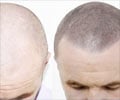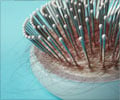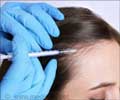Intermittent fasting may slow hair growth by affecting hair follicle stem cell activity.

Intermittent fasting triggers interorgan communication to suppress hair follicle regeneration
Go to source) Researchers discovered that mice subjected to intermittent fasting regimens experienced improved metabolic health but also exhibited slower hair regeneration compared to mice with unrestricted food access. While a small human trial also hints at a similar effect, it's anticipated to be less pronounced due to differences in metabolic rate and hair growth patterns between humans and mice.
‘#Intermittent_fasting might be a surprise hair-raiser! 🤯 New research suggests it could actually slow down #hairgrowth. #fasting #hairloss’





What is Intermittent Fasting
Intermittent Fasting (IF) is an eating pattern that cycles between periods of eating and fasting. IF can help with weight loss, improve insulin sensitivity, and reduce inflammation. IF is not suitable for everyone, and it's important to consult with a healthcare professional before starting any new diet.“We don't want to scare people away from practicing intermittent fasting because it is associated with a lot of beneficial effects—it's just important to be aware that it might have some unintended effects,” says senior author and stem cell biologist Bing Zhang of Westlake University in Zhejiang, China.
In addition to its metabolic benefits, previous studies have shown that fasting can improve the stress resistance of stem cells associated with blood, intestinal, and muscle tissue, but little is known about how it impacts peripheral tissues such as skin and hair. Zhang’s team hypothesized that fasting might also be beneficial for skin tissue regeneration, the process by which old and damaged cells are replaced.
To test this, they examined hair regrowth in mice that were shaved and then subjected to different intermittent fasting regimes. Some mice were fed on a time-restricted feeding (TRF) schedule that involved 8 hours of food access and 16 hours of fasting each day, while other mice were subjected to alternate-day feeding (ADF).
While control mice that had unlimited access to food had regrown most of their hair after 30 days, mice on both intermittent fasting regimes showed only partial hair regrowth after 96 days.
Advertisement
Using genetic engineering methods, the team showed that this fasting-induced apoptosis was driven by an increased concentration of free fatty acids near the hair follicles, which caused a build-up of harmful radical oxygen species within the HFSCs. Free fatty acids also caused human HFSCs to undergo apoptosis in vitro.
In comparison, epidermal stem cells, which are responsible for maintaining the epidermal skin barrier, were unaffected by intermittent fasting. The major difference between these stem cell types is that epidermal stem cells have a higher antioxidant capacity. When the team tested whether antioxidants could mitigate the effects of fasting on hair growth, they showed that both topical application of vitamin E and genetic upregulation of antioxidant capacity helped HFSCs survive fasting.
The team also conducted a small clinical trial with 49 healthy young adults to examine whether fasting similarly affects hair regrowth in humans. They showed that a time-restricted diet involving 18 hours of fasting per day reduced the average speed of hair growth by 18% compared to controls, but larger studies would be needed to verify this effect given the study’s small sample size and short duration (10 days).
“The human population is very heterogeneous, so the effects might be different for different people,” says Zhang. “Mice also have a very high metabolic rate compared with humans, so fasting and metabolic switching have a more severe effect on mouse HFSCs. We see a milder effect in humans—there are still apoptotic stem cells, but many HFSCs survive. So, there is still hair regrowth; it’s just a little bit slower than usual.”
In future work, the researchers plan to collaborate with local hospitals to investigate how fasting impacts other types of stem cells in the skin and other body systems.
“We plan to examine how this process affects the regeneration activities in other tissues,” says Zhang. “We also want to figure out how fasting impacts skin wound healing and identify metabolites that could help the survival of HFSCs and promote hair growth during fasting.”
Reference:
- Intermittent Fasting Triggers Interorgan Communication to Suppress Hair Follicle Regeneration - (https://www.cell.com/cell/fulltext/S0092-8674(24)01311-4)














